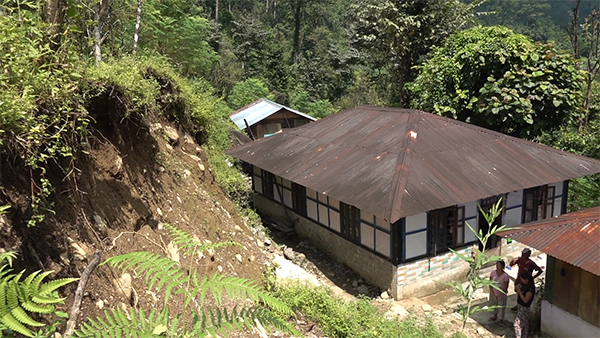 An increasing number of landowners in Samtse want to exchange their land with the government reserve land. Today, some of them live in constant fear of flash floods washing away their homes and land. There are others unable to grow any crops as their land have turned barren due to erosion.
An increasing number of landowners in Samtse want to exchange their land with the government reserve land. Today, some of them live in constant fear of flash floods washing away their homes and land. There are others unable to grow any crops as their land have turned barren due to erosion.
Among the many who applied for land exchange is 28-year-old Dali Maya Ghalley from Chhujoogthang or Chettri Tar village in Pemaling Gewog. She, along with her family, has to regularly check the condition of the road above their house which can erode any time. Following such a concern, she requested for another land to relocate her family this year. Her request is yet to be approved. “The road eroded last year as well as this. It slightly damaged our house. When it rains, we cannot sleep. We fear the road would slide down and bury us. We wait for the rain to stop and return to sleep,” she said.
In another village in the gewog, Chandra Koirala lives under a constant threat of a flash flood. There is a stream flowing above her house, which – fed by the rains- overflowed and nearly damaged her home and a cowshed a few months ago.
“The stream is not a big problem during the dry seasons. But in summer, it is a different story. The small stream above my house swells and causes flash floods. It washes down debris and damages our fields and cowsheds,” said Chandra from Pangthangjoong.
Similarly, nearly an acre of Bhakta Bdr Limbu’s land remains idle following a landslide triggered by a flash flood.
“It happened all of a sudden. We were working in our fields and I heard a loud sound. When I reached here, I saw the land had eroded. Our water pipes were also destroyed. I used to grow crops on the land and this year, I thought of planting orange trees,” said Bhakta Bdr, a resident of Pangthangjoong.
Bhakta Bdr plans to apply for a land exchange soon.
Of the 15 gewogs in Samtse, Pemaling alone has received over 40 land exchange applications so far. Of them, only 4 have been approved.
The local leaders, during the recent Dzongkhag Tshogdu, expressed concerns about the current land exchange rules and regulations. The Rules and Regulations for Lease of Government Reserved Forest Land and Government Land allows the exchange of rural registered land with government reserved land if the land is destroyed by natural calamities or if the land falls within critical watershed areas.
“Some of the villagers’ land are neat a water source and there are water reservoirs. So, they cannot work on the land. As per the land exchange rules, if one’s land is at a water source, the source should benefit a minimum of 100 households to claim an exchange. But in some cases, the water source benefits only about 20 to 30 households. This makes them ineligible to seek land exchange,” said Pemaling Gewog’s Mangmi Sangay Penjor.
Samtse Gewog’s Gup Wangchuk Lepcha said “a lot of villagers are applying for land exchange because most of their land are filled with stones and sands. It cannot be used for farming. People do not own much land and whatever they have are also left barren.”
“In Dumtoed Gewog, from about 60 households who applied for land exchange, 20 households are genuine cases. They fulfil the criteria for a land exchange. Some of their land are near the water source and some have been damaged by natural hazards. However, the land exchange processes are too lengthy and it is taking time,” said Damber Singh Rai, Dumtoed Gup.
The district land registrar Tshultrim Zangmo said that giving land exchange service to every applicant will be difficult. There are limited government reserve land. “As per the Land Act of Kingdom of Bhutan 2007, one can only apply for land exchange if their land has been damaged by natural calamities. At the dzongkhag level, we do not have the right to change the rules and regulations. And when it comes to giving land exchange to those who have unfertile lands, we cannot do that for everyone. We do not have a large government reserve land.”
The Dzongkhag Tshogdu decided to write to the National Land Commission Secretariat and the Samtse constituency’s Member of Parliament to relook into the rules and regulations on exchanging rural and government reserve land.
Samtse has the most number of land exchanged in the country. The National Land Commission Secretariat approved about a thousand applications in the district so far.
Passang Dorji, Samtse
Edited by Sonam Wangdi






